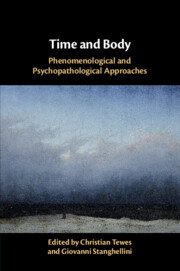Book contents
- Time and Body
- Endorsements for Time and Body
- Time and Body
- Copyright page
- Dedication
- Additional material
- Contents
- Figures
- Contributors
- 1 Introduction – Time and Body
- 2 Time, the Body, and the Other in Phenomenology and Psychopathology
- Part I Body and Time: General Aspects
- Part II Grief and Anxiety
- 7 Bereavement and the Meaning of Profound Feelings of Emptiness
- 7.1 Commentary on “Bereavement and the Meaning of Profound Feelings of Emptiness: An Existential-Phenomenological Analysis”
- 8 Body-as-Object in Social Situations
- 8.1 Commentary on “Body-as-Object in Social Situations: Toward a Phenomenology of Social Anxiety”
- Part III Borderline Personality and Eating Disorders
- Part IV Depression, Schizophrenia, and Dementia
- Index
- References
7.1 - Commentary on “Bereavement and the Meaning of Profound Feelings of Emptiness: An Existential-Phenomenological Analysis”
Relearning the Self among Intimate Others
from Part II - Grief and Anxiety
Published online by Cambridge University Press: 30 October 2020
- Time and Body
- Endorsements for Time and Body
- Time and Body
- Copyright page
- Dedication
- Additional material
- Contents
- Figures
- Contributors
- 1 Introduction – Time and Body
- 2 Time, the Body, and the Other in Phenomenology and Psychopathology
- Part I Body and Time: General Aspects
- Part II Grief and Anxiety
- 7 Bereavement and the Meaning of Profound Feelings of Emptiness
- 7.1 Commentary on “Bereavement and the Meaning of Profound Feelings of Emptiness: An Existential-Phenomenological Analysis”
- 8 Body-as-Object in Social Situations
- 8.1 Commentary on “Body-as-Object in Social Situations: Toward a Phenomenology of Social Anxiety”
- Part III Borderline Personality and Eating Disorders
- Part IV Depression, Schizophrenia, and Dementia
- Index
- References
Summary
As a bereavement researcher rooted in developmental psychology (trained in a sociocultural and cultural–historical tradition) and with a keen eye to applied phenomenology , Allan Køster's idea of investigating bereavement responses in their particular aspects is appealing (Køster, 2021; Winther-Lindqvist, 2017).
- Type
- Chapter
- Information
- Time and BodyPhenomenological and Psychopathological Approaches, pp. 144 - 149Publisher: Cambridge University PressPrint publication year: 2020



